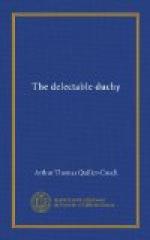“Oh, you remarked that, did you?”
“Yes, and meant to ask him about it afterwards; but forgot, somehow.”
“Do you remember where we were—what we were passing—when he did this?”
“Not clearly. I was infernally ill just then. Why did he do it?”
I was silent.
“I suppose it had some meaning?” he went on.
“Yes, it had. And excuse me when I say that I’m hanged if either you or your Constant Readers shall know what that meaning was. My dear fellow, you belong to a strong race—a race that has beaten us and taken toll of us, and now carves ‘Smith’ and ‘Thompson’ and such names upon our fathers’ tombs. But there are some things you have not laid hands on yet; secrets that we all know somehow, but never utter, even among ourselves, nor allude to. If I told you what Billy Tredegar did to-day, and why he did it, I tell you frankly your article would make some thousands of Constant Readers open wide eyes over their breakfast-cups. But you won’t know. Why, after all, should I say anything to spoil Cornwall’s prospects as a health-resort?”
My friend took this very quietly, merely observing that it was rather late in the day to take sides against Hengist and Horsa. But he was sorry, I could see, to lose his local colour. And as I looked down, for the last time that night, upon Troy, this petition escaped me—
“O my country, if I keep your secrets, keep for me your heart!”
THE SPINSTER’S MAYING.
“The fields breathe sweet,
the daisies kiss our feet,
Young lovers meet, old wives a-sunning sit;
In every street these tunes our ears do greet—
Cuckoo, jug-jug, pu-wee, to-witta-woo!
Spring, the sweet Spring.”
At two o’clock on May morning a fishing-boat, with a small row-boat in tow, stole up the harbour between the lights of the vessels that lay at anchor. She came on a soundless tide, with her sprit-mainsail wide and drawing, and her foresail flapping idle; and although her cuddy-top and gunwale glistened wet with a recent shower, the man who steered her looked over his shoulder at the waning moon, and decided that the dawn would be a fine one. A furlong below the Town Quay he left the tiller and lowered sail: two furlongs above, he dropped anchor: then, having made all ship-shape, he lit a pipe and pulled an enormous watch from his fob. The vessels he had passed since entering the harbour’s mouth seemed one and all asleep. But a din of horns, kettles, and tea-trays, and a wild tattoo of door-knockers, sounded along the streets behind the stores and houses that lined the water-side. Already the town-boys were ushering in the month of May.
The man waited until the half-hour chimed over the ’long-shore roofs from the church-tower up the hill; set his watch with care; and sat down to wait for the sun. Upon the wooded cliff that faces the town the birds were waking; and by-and-bye, from the three small quays came the sound of voices laughing, and then a boat or two stealing out of the shadow, each crowded with boys and maids. Before the dawn grew red above the cliff where the birds sang, a dozen boats had gone by him on their way up the river, the chatter and broken laughter returning down its dim reaches long after the rowers had passed out of sight.




